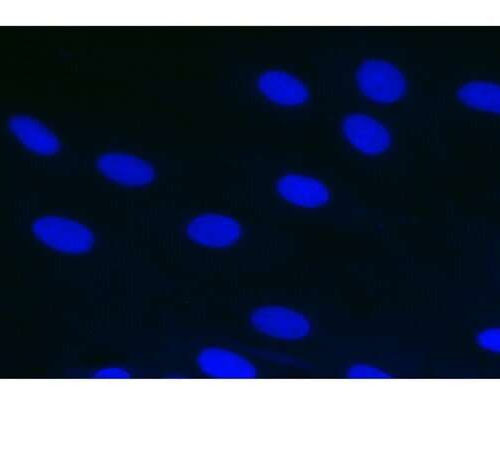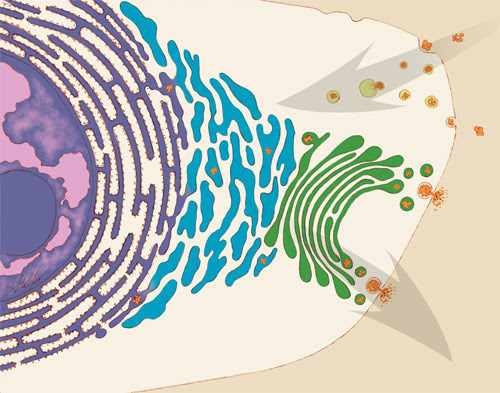by University of Nottingham untreated and treated with kinase inhibitors. Following treatment with inhibitors targeting CDK12 nuclear foci in DM1 cells are reduced. Credit: Dr. Ami Ketley , the University of Nottingham Scientists at the University of Nottingham have taken a step closer towards developing a treatment for the long-term genetic disorder, myotonic dystrophy. In...
Tag: <span>RNA</span>
Abdominal fat cells could aid sepsis fight
by University of Edinburgh Experts say the cells—located in the curtain of tissue that covers the intestines—play a vital role in containing the spread of peritonitis, which is triggered by abdominal infection after a perforation in the intestines. The study could pave the way for new treatments to combat sepsis, which kills more than 50,000...
The Endoplasmic Reticulum: Networking Inside the Cell
Like a successful business networker, a cell’s endoplasmic reticulum (ER) is the structure that reaches out—quite literally—to form connections with many different parts of a cell. In several important ways, the ER enables those other parts, or organelles, to do their jobs. Exciting new images of this key member of the cellular workforce may clarify...
Step aside CRISPR, RNA editing is taking off
Making changes to the molecular messengers that create proteins might offer flexible therapies for cancer, pain or high cholesterol, in addition to genetic disorder Thorsten Stafforst found his big break at the worst possible time. In 2012, his team at the University of Tübingen in Germany discovered that by linking enzymes to engineered strands of...
Scientists find RNA affecting skin cancer progression
PRECSIT promotes growth and spread of cutaneous squamous cell carcinoma UNIVERSITY OF TURKU Researchers at the University of Turku, Turku University Central Hospital, and Western Cancer Center (FICAN West) have discovered a new RNA molecule, PRECSIT, which regulates the growth and invasion of squamous cell carcinoma of the skin. In the future, PRECSIT could potentially...
Aggressive melanoma: Circular RNA explains spread
Researchers have zoomed in on the fine molecular and epigenetic mechanisms that explain the aggressive spread of melanoma. Scientists examine the epigenetic silencing of circRNA and how this drives the spread of melanoma. Along with DNA and proteins, RNA is one of the three essential macromolecules necessary for all forms of life. The typical process...
CRISPR tool modifies genes precisely by copying RNA into the genome
The ultimate goal of genome editing is to be able to make any specific change to the blueprint of life. A ‘search-and-replace’ method for genome editing takes us a giant leap closer to this ambitious goal. Randall J. Platt Variation in the DNA sequences that constitute the blueprint of life is essential to the fitness...
Silencing RNA nanotherapy shows promise against pancreatic cancer
by University of South Florida Despite advances in cancer survival, more than 90 percent of people with pancreatic cancer die within five years. Most patients with pancreatic tumors (and half of those with colorectal cancers) carry a mutation in the KRAS gene, which normally controls cell growth and death. The KRAS oncogene was discovered more...
Delivery system can make RNA vaccines more powerful
Posted YesterdayThis news or article is intended for readers with certain scientific or professional knowledge in the field. Vaccines made from RNA hold great potential as a way to treat cancer or prevent a variety of infectious diseases. Many biotech companies are now working on such vaccines, and a few have gone into clinical trials....
What are Enhancer RNAs (eRNAs)?
By Dr. Surat P, Ph.D. Reviewed by Michael Greenwood, M.Sc. Enhancer RNAs, or eRNAs, are short non-coding RNA molecules that are transcribed from the loci of enhancers. They are involved in the regulation of gene transcription and can be a therapeutic target for diseases. Enhancer RNAs were discovered in 2010 through high-throughput sequencing to detect stimulus-dependent enhancers. This revealed the RNApolymerase II-dependent transcription of enhancer RNAs. These are...




